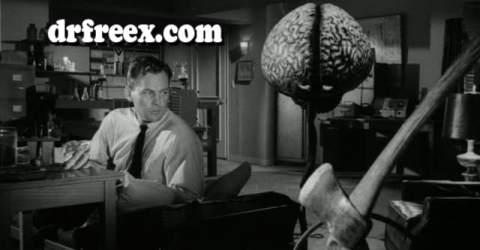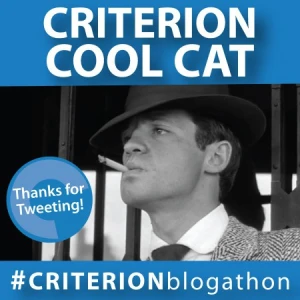The ad copy for Stanley Kubrick’s 1962 film version of Vladimir Nabokov’s Lolita is pretty incisive: “How did they ever make a movie of Lolita?” The answer seems to be, by changing everything except the broadest strokes of the novel.
 There are some books it is simply insane to try to adapt to film, and chances are, someone has gone ahead and done it anyway. David Cronenberg did Naked Lunch, Joseph Strick did Ulysses. Lolita, with its extremely volatile subject matter and Unreliable Narrator, certainly fits in that category. Is it even possible to emulate the Unreliable Narrator in a movie setting? The best I can think of is Rashomon, but that’s an ill fit at best. I suppose That Obscure Object of Desire comes closest.
There are some books it is simply insane to try to adapt to film, and chances are, someone has gone ahead and done it anyway. David Cronenberg did Naked Lunch, Joseph Strick did Ulysses. Lolita, with its extremely volatile subject matter and Unreliable Narrator, certainly fits in that category. Is it even possible to emulate the Unreliable Narrator in a movie setting? The best I can think of is Rashomon, but that’s an ill fit at best. I suppose That Obscure Object of Desire comes closest.
After the unpleasant difficulties with the making of Spartacus, we can see Kubrick going in the most opposite direction possible. The story is small in scope if not in locations; it is a comedy (a very dark one) as opposed to drama, and it is shot in black and white, which can also be seen as an attempt at distancing the audience from what is happening onscreen. In 1962, even Roger Corman was making movies in color; this was a deliberate stylistic choice. This was the first time a Kubrick production was based in England, perhaps hoping for an easier time with their film censors.
Of course, the most obvious change is increasing the title character’s age from 12 to 14, and having her portrayed by a well-developed 16 year-old, Sue Lyon – all necessary to even attempt the movie, in that pre-MPAA rating period. Even had the possibility of an “R” even been available, I can still remember the furor over Jody Foster’s underage prostitute in Taxi Driver, ditto Brooke Shields in Pretty Baby, both in the much more permissive 70s.
 Humbert Humbert in this version is identified only as “divorced”, the death of his boyhood sweetheart and subsequent attempts to rekindle that relationship with girls her age, his obsession with “nymphets” is scrubbed away; Humbert sees Lolita in her two-piece bathing suit, and that is it. All that is missing is a cartoon BO-I-I-I-NG sound effect. “Lolita”, as I recall, is Humbert’s pet name for the girl, who is actually named Dolores. This too, is pitched by the wayside, perhaps to avoid confusion. I can easily see moviegoers scratching their heads and saying, “What? I thought her name was Lolita?”
Humbert Humbert in this version is identified only as “divorced”, the death of his boyhood sweetheart and subsequent attempts to rekindle that relationship with girls her age, his obsession with “nymphets” is scrubbed away; Humbert sees Lolita in her two-piece bathing suit, and that is it. All that is missing is a cartoon BO-I-I-I-NG sound effect. “Lolita”, as I recall, is Humbert’s pet name for the girl, who is actually named Dolores. This too, is pitched by the wayside, perhaps to avoid confusion. I can easily see moviegoers scratching their heads and saying, “What? I thought her name was Lolita?”
So, remaining is the novel’s longing, Humbert’s scurrilous use of Lolita’s mother to gain access to the girl, and his subsequent tyrannical attempts to completely control her life, for fear he will lose her; of course, he does, and she resurfaces three years later, married, pregnant, and needing money. As was the case with Paths of Glory, an ersatz happy ending with Humbert actually marrying Lolita was considered – and it makes my head ache to try and figure out the legal and moral maneuvering that would take – but what we are left with is a modified version of the book’s ending. We are told Humbert’s fate, but not Lolita’s. Also remaining are Nabokov’s potshots at American pop culture, which Kubrick probably endorsed.
 If we are talking about the major changes made, it becomes necessary to talk about the greatly expanded role of the writer, Clare Quilty, played by Peter Sellers. Though his presence is apparent in the book, he becomes a definite mover and shaker of the events in the movie, and though I never thought I would say this, Sellers actually becomes quite tiresome in this, effecting disguises to generally mess with Humbert until, as in the book, he receives his comeuppance. Annoyingly.
If we are talking about the major changes made, it becomes necessary to talk about the greatly expanded role of the writer, Clare Quilty, played by Peter Sellers. Though his presence is apparent in the book, he becomes a definite mover and shaker of the events in the movie, and though I never thought I would say this, Sellers actually becomes quite tiresome in this, effecting disguises to generally mess with Humbert until, as in the book, he receives his comeuppance. Annoyingly.
The rest of the cast is marvelous. James Mason as Humbert, Shelley Winters as Charlotte, Lolita’s doomed mother, and Sue Lyon are all superb as unlikable people who are still very familiar and retain some degree of sympathy.
 It is to be expected that even our favorite artists have an off-day, or, to put a finer point on it, do something that doesn’t particularly resonate with us. Hell, I actually find the concept of someone turning out something I consistently love to be somehow frightening, inhuman. I think I have finally found that lead slug in my Kubrick experience. It was the first time I found myself glancing at the time repeatedly, counting the minutes left, thinking “Two and a half hours? Really?“.
It is to be expected that even our favorite artists have an off-day, or, to put a finer point on it, do something that doesn’t particularly resonate with us. Hell, I actually find the concept of someone turning out something I consistently love to be somehow frightening, inhuman. I think I have finally found that lead slug in my Kubrick experience. It was the first time I found myself glancing at the time repeatedly, counting the minutes left, thinking “Two and a half hours? Really?“.
Well, next up are two of my favorites, Dr. Strangelove and 2001, so I can feel better about Peter Sellers and life in general. Except for the fact that life tends to suck in Kubrick movies.
8 Comments
Comments RSS TrackBack Identifier URI



I really liked this when I saw it years ago…but then I’ve never read the book.
I gave it a chance, but I really disliked Lolita. What? You’re surprised?! The thing is, Kubrick examines things extremely closely, and sometimes that means killing them. In 2001 and Clockwork Orange, this works magnificently, because the human element, the story that draws us, as human beings, into the narrative is not the linear two-fisted typical narrative of the story. Instead, it is the double-domed philosophizing (and I will never use that word again) around the ideas that in fact make us human. Their Discovery (ooh, film reference!) is what causes us to examine the thoughts that surround us, and makes us different from the animals–makes us, in fact, cerebral enough to appreciate a Kubrick.
Lolita fails because it falls outside these parameters. It’s a story of lust told by someone who can never experience lust, but knows what the definition is in the dictionary. That ought to be enough, right? To know what the word means?
Well, no…because the word is simply an approximate definition of an emotion, not an amalgram of facts and data. And as we all ought to know, yes, emotions can be manipulated, but they cannot be reproduced…or faked.
Wow, am I boring or what?
Or what.
I think I’ll use that as my mutant name. “Orwhat”? “OMG, your powers must be awesome, LOL!”
“Yes…I am…Orwhat.”
My name is Orwhat (musical sting)… Doctor Scientist Orwhat! (evil things happen) Check out my awesome musical sting! Ha ha ha ha!
[…] that evening, I watched Lolita. The next time I have a weekend like this, I really must find shorter movies. Share […]
[…] does what he does best, magnificently underplaying two of his three roles (I found him annoying in Lolita, but I have to admit his German psychiatrist schtick in that is quite good), and providing a truly […]
[…] – how this surprised anyone is beyond me, given the changes made to the paper versions of Lolita, Red Alert, A Clockwork Orange and The Luck of Barry Lyndon. It is easier and far more common to […]